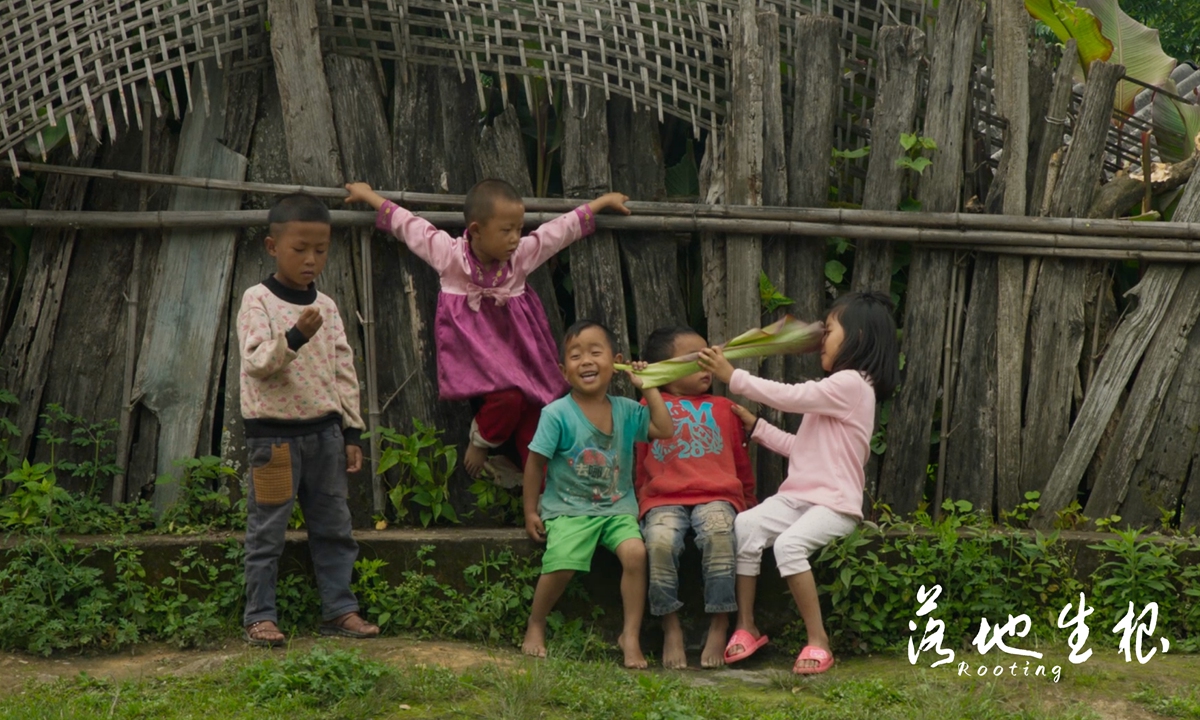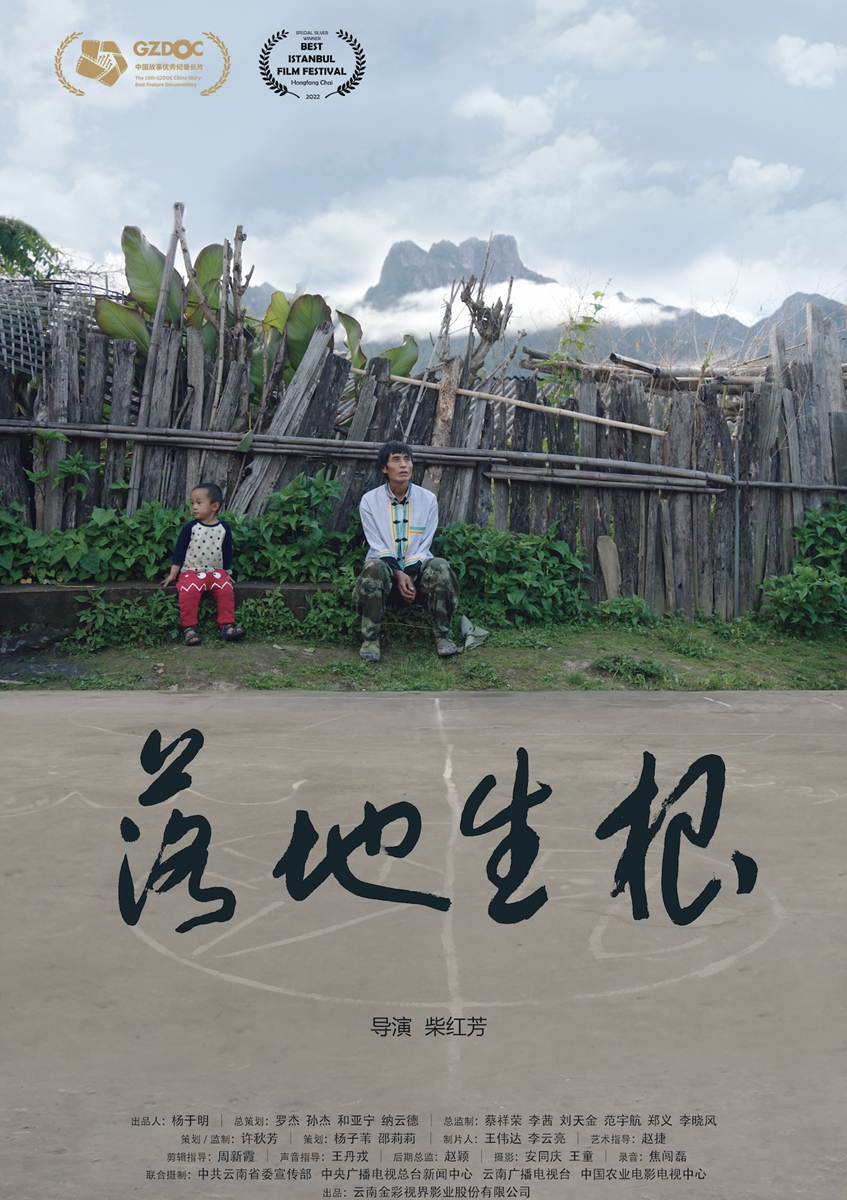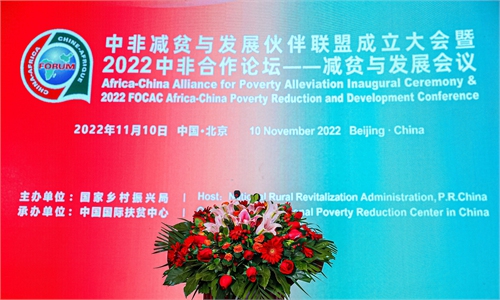ARTS / CULTURE & LEISURE
Poverty alleviation documentary shares China’s efforts with world
Rooted in the land

Promotional material for Rooting Photo: Courtesy of Elemeet
What does a road mean to a village "separated from the world for thousands of years?" Without this road, a villager has to carry his broken and heavy refrigerator on his back, spending four hours walking down the mountain to get it repaired and another four hours carrying it back. Without this road, an elderly woman who becomes sick has to be carried by young male villagers on a stretcher precariously down a mountain track to the hospital kilometers below…"For generations, all we wanted to have is a road." This was the desperate hope and inner voice of all the villagers in this mountainous town. After years of waiting, their dream finally came true thanks to a poverty alleviation campaign that brought great changes to their lives. This is the real story depicted in the Chinese documentary Rooting, which is set to premiere in Chinese theaters on Thursday.
The film shows how the Nu ethnic group, one of the least populous of China's 56 ethnic groups, in Shawa village in Nujiang Lisu Autonomous Prefecture, Southwest China's Yunnan Province, shook off a "millennium of poverty" with the help of Chinese cadres.
The Nu ethnic group, which has a population of around 38,000 people in China, is also called a "direct-transition" minority ethnic group because the Nu people didn't bid farewell to a primitive way of life until the founding of the People's Republic of China in 1949, after which they directly stepped into a socialist society.
Tough shooting experience
In order to show the real life of the Nu people, the film crew settled in Shawa village, which is 2,000 meters above sea level, for four years, shooting a total of more than 700 hours of footage to finally produce this painstaking work.
Chai Hongfang, the director of Rooting, told the Global Times that she once went to over 100 villages in Yunnan Province as part of field research, and then made the final decision to film in Shawa village after visiting it three times.
The director recalled that when she first climbed the mountain she broke down and failed to reach the village even when using a walking stick.
Enduring the harsh travel and living environment, another big difficulty for the shooting team was the language barrier as they could not understand the villagers' dialect and since the village had been isolated from the outside world for a long time, the villagers were very shy and would run and hide whenever they saw the film crew.
"In the first month, we didn't do anything, but tried every means to get close to them including learning their dialect, cooking food for them, drinking, singing and dancing with them. They didn't know that we would stay there with them for over four years," she said.
Solid shooting enabled the crew to capture complete and real scenes of the Nu people, whose lives were dramatically changed after the road was built with the support of government's poverty alleviation campaign.
In the documentary, when the Chinese local officials announced they decided to build the road, tears burst from the villagers' eyes showing their extreme excitement.
The road provided them more options: Some of them chose to move down the mountain and live in a community building, and some of them choose to stay in the village, opening the first retail shop in the village while planting vegetables.
This choice brought locals hope. They bid farewell to their long-standing "primitive society."
Instead of planting rice and corn that produced poor harvests, they learned to plant strawberries, walnuts and kiwi under the guidance of agricultural specialists. Meanwhile, the lovely children that melted the heart of many moviegoers in the film were able to get a better education.

Promotional material for Rooting Photo: Courtesy of Elemeet
Setting a good example"The film is full of emotion - sadness, longing, compassion, hope and happiness. It is frequently deeply moving," Robert Walker, an Emeritus Fellow at Green Templeton College, Oxford University, and a professor at Beijing Normal University, at a pre-screening event in Beijing on Friday.
Chai had a very simple reason to make the film. She said she just wanted to record all those who have contributed to China's poverty alleviation so they could be remembered.
The poverty alleviation campaign has achieved a great success. A total of 31.45 million people climbed out of poverty and found work in 2021, an increase of 1.26 million, or 4.2 percent, over the previous year, according to the Xinhua News Agency.
Some Western media outlets have smeared the campaign, calling it "unsustainable" and "damaging the locals' original environment," which Walker told the Global Times is something with which he "profoundly" disagrees.
"My view is that no other country would have built that road. Now, we may say that road should not have been built as it destroyed that hillside of planted trees. I certainly don't think that's true. I think other countries have never set out to eradicate poverty, and therefore, they've never faced the decision of how somebody has the right to not be poor."
He pointed out that many developing countries can learn from China's efforts in poverty alleviation and the documentary is playing a positive role in telling Chinese stories well, adding that China should produce more stories that depict the Chinese people, which could resonate with more people in the world.




